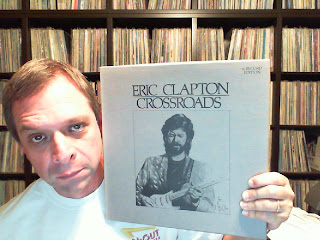In 1973, Olivia Newton-John won the "Best Country Vocal Performance, Female" Grammy award for the title track of this Lp, "Let Me Be There." To say that the CMA was pissed would be an understatement. For this 25-year-old Australian to go up against Tammy Wynette and Dottie West, both of whom were nominated in the same category, and
win... well, that was too much.
To be fair, "Let Me Be There" was a
much better song than Tammy's ("Kids Say The Darndest Things") or Dottie's ("Country Sunshine"), but there was a feeling that the crossover nature of the song, which hit huge with Top 40 audiences and signalled Olivia's breakthrough hit, tainted the jury pool, so to speak. It might be possible.
I put this album on thinking that, as with so many "light rock" artists I disdained during the 70s (Gordon Lightfoot, Dan Fogelberg, Karla Bonoff), I would feel a rush of appreciation -- Good Lord! How could I have been so blind to the obvious musical talent, the mastery of the material? But sometimes, a stone is just a stone, no matter how many years of wind and wave polish it. "Let Me Be There" compiles almost a side's worth of tracks from Olivia's Uni debut Lp ("If Not For You," 1972), including the hit Dylan cover, and throws in another side's worth of MOR covers from the early 70s.
I made the mistake of listening to Side 2 first, and let me tell you, hearing Olivia warble her way through John Denver's "Take Me Home, Country Roads" was like eating uncooked Jell-O. This is followed by a cover of the old Merrilee Rush hit, "Angel Of The Morning," but there's nothing new to add, and it's crunchy-sweet too. Then there's a Lightfoot cover. Urrrgh.
Flipping over to Side 1 was a bit better, with the title track at the top and "If Not For You" at the end, but then there's Olivia trying her best to interpret "Me And Bobby McGee" -- just imagine that, if you will. Janis she ain't and try as she might, she sounds like she was smiling the whole way through. And to add insult to injury, MCA chose another clinker from her first Lp, a horrid syrupy rendition of "Banks Of The Ohio" that is enough to put a zombie off his brain souffle.
The only surprise here is a truly stunning cover of Lesley Duncan's "Love Song", off of Elton John's "Tumbleweed Connection" album. It's so good, in fact, that I'm convinced it would have been a radio hit if the bonehead A&R doofuses at MCA had had the smarts to release it. (There's a reason MCA is referred to in the industry as "Music Cemetary of America".)
So, yeah, some things don't get better with age. Lightfoot has. Wendy Waldman has. Even, God help me, Johnny Mathis has (or at least I've finally learned to appreciate him). But not this album -- sorry. (Although the photo on the cover
is stunning.)






